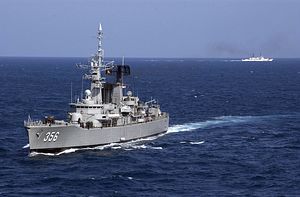Last Friday, an Indonesian Navy Van Speijk-class frigate, the Oswald Siahaan, intercepted and fired shots at a Chinese fishing trawler in waters off the Natuna Island, in the South China Sea. The Indonesian frigate ultimately seized the fishing vessel, the Gui Bei Yu-27088, and arrested its eight crewmembers. According to a spokesperson fro the Indonesia Navy, Major Budi Amin, the incident took place in Indonesia’s exclusive economic zone, part of which overlaps with China’s ambiguously defined nine-dash line claim in the South China Sea.
“This arrest was made to show the world that Indonesia will take firm action against ships that violate our territory,” Amin said. He further noted that shots fired from the Indonesian frigate hit the stern of the Chinese fishing trawler, but that no one was injured. “We strongly suspect they were poaching fish in our territory because we found fresh fish on the boat,” he added. “The boat engine was faulty so we had to tow the boat to a port in Natuna. We also arrested eight Chinese crew to question their activities.”
Separate remarks by the commander of Tanjung Pinang Main Naval Base, Commodore S. Irawan, noted that the Indonesian frigate’s warning shots were ignored initially due to Chinese coast guard nearby: “At first we fired warning shots across the [Gui Bei Yu] but the warning was ignored because of the presence of the Chinese coast guard protecting it, but, undaunted, our men on the Oswald Siahaan pursued it and fired another shot before it was finally stopped and arrested.” It is unclear if the Chinese coast guard attempted to intervene, but Indonesian accounts of the incident indicate that this is unlikely.
The Indonesian government under President Joko “Jokowi” Widodo has made maritime law enforcement against illegal foreign fishing activity a priority. Since early 2015, Indonesia’s Ministry of Maritime Affairs and Fisheries has captured nearly 200 foreign fishing boats. Furthermore, the Jokowi administration has pursued a controversial policy of blowing up captured foreign fishing vessels as a deterrent to continued illegal fishing activity. In a statement following Friday’s incident, the Indonesia military noted that the arrest was a “success in following up the orders of military chief General Gatot Nurmantyo in increasing surveillance at all borders, including the South China Sea.”
In response to the arrest of the fishing crew and the seizure of the ship, China lodged a “stern” protest with Indonesia, according to Reuters. Xu Hangtian, the political counselor for the Chinese Embassy in Jakarta, told the Jakarta Post that “The Chinese side is willing to resolve [this] properly through friendly consultation and negotiation with the Indonesian side.”
“China and Indonesia are friendly neighbors. There is no territorial dispute between our two countries in the South China Sea,” he added. Notably, the Post‘s report notes that the Chinese response to Friday’s incident did not reiterate China’s “historic” fishing presence in the southern South China Sea, near the Natuna Islands.
Chinese foreign ministry spokeswoman Hua Chunying didn’t reiterate “historic” rights in her comments to Reuters either. “China and Indonesia have a different point of view about the waters where the incident happened,” she said. “A Chinese fishing boat was carrying out normal production activities there.”
Friday’s incident marks the second incident in the Natuna waters in recent months to cause a high-profile diplomatic incident between Indonesia and China. In March, a similar incident drew intervention by a Chinese coast guard vessel, which ended up forcibly rescuing a seized Chinese fishing vessel from Indonesian maritime authorities. Moreover, in April, the Indonesian navy detained a Chinese trawler that was wanted by Interpol for illegal fishing in Argentina’s exclusive economic zone.
The context of these incidents between Indonesia and China in the South China Sea is related to broader regional tensions, which haven risen in recent years amid increasingly assertive Chinese behavior. However, Indonesia, unlike the Philippines, Vietnam, Malaysia, Brunei, and Taiwan, is not a direct claimant to any of the disputed features in the South China Sea. Moreover, while these incidents have taken place in Indonesia’s exclusive economic zone off the Natuna archipelago, China does not dispute Indonesia’s sovereignty over the islands.
Nevertheless, similar incidents between Indonesian and Chinese authorities in the Natuna Sea have occurred since at least 2010. Indonesia has sought clarification from China on the nature of its maritime claims in the region, but Beijing hasn’t offered an explanation of its ambiguous dashed-line claim. The March incident marked the first major flare-up between the two countries since the Jokowi administration came to power in Indonesia in late-2014.
While Beijing appears to be seeking a negotiated settlement after Friday’s arrest, the Indonesian side is pushing ahead, seeking potential legal action against the Chinese fishermen. “If the evidence is confirmed by Navy investigators then they will hand case dossiers to prosecutors for trial,” Amin reportedly told the Jakarta Post.
For more on the background between China and Indonesia in the Natuna Islands, listen to a recent podcast on the March stand-off.

































